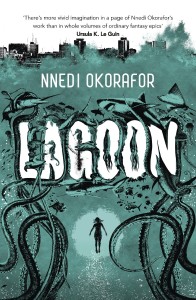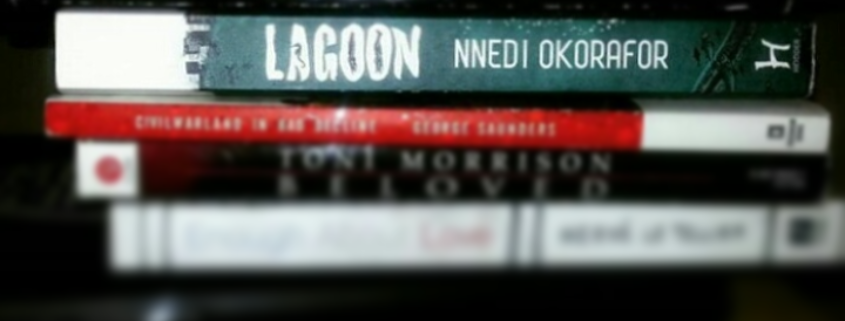The Voices in Our Heads: Polyvocality, Power & Nnedi’s Lagoon
When we speak or write, our voice is not the only one being (re)produced. It is a mutant composite of your mom blasting Rocio Durcal at 7 a.m. to announce it’s cleaning day, all day; of your pops saying Boiya, you think you smart when you finally gathered the courage to challenge his authority; of your crew saying stop being such a bitch and go talk to her when you was a young drunk at the bar; of your body trying to activate experiences beyond immeasurable skies over tract homes; of even your mind when it tries to walk amongst the intellectual redwoods of Cedric Robinson and Michael Foucault. You and your voice are not you, you are many: people and things . . .
Yet, in fiction (and most creative arts), the artist generally tries to gather all that personal and historical DNA, and mask it inside the “default” singular voice. This tendency usually results not only in a point-of-view that leans towards (or staggers out of) a dominant First World—straight, white, male, Christian—gaze, but a voice that tends to reanimate the marginalities and silences that people want to resist when facing social, political, and aesthetic borders. Our first impulse is to acculturate, not resist. WSCP hegemony is not only theory; it is real and difficult terrain to work through, personally and aesthetically.
I offer an author and book we can look to: a bright star in a constellation emerging against not only old guard ideas around narrative, characters, and content, but the singular point of view. Nnedi Okorafor’s third adult novel Lagoon is a high-minded sci-fi fantasy drama that replaces singular/univocality with the power of polyvocality: the practice that many points-of-view and ideas can coexist to shape and drive a narrative. Sure, our bookshelves and the academic canon celebrate the traditional gawds of polyvocality, Toni Morrison and William Faulkner, but Nnedi rides a giant wave all her own.
 Within Lagoon’s tight yet expansive 293 pages, Nnedi does so much to move literary desire and language outside of the normative imaginary: the story takes place outside of America’s borders in Lagos, Nigeria; women and men occupy equal space in the trajectory of the protagonist(s) struggle and resolution; the world is populated only by African bodies; the words characters speak do not privilege “the King’s English,” while slang / creole vernacular blooms easily alongside it; the celestial beings that come to Earth are not there solely to colonize; and sex and sexuality are constantly represented as fluid.
Within Lagoon’s tight yet expansive 293 pages, Nnedi does so much to move literary desire and language outside of the normative imaginary: the story takes place outside of America’s borders in Lagos, Nigeria; women and men occupy equal space in the trajectory of the protagonist(s) struggle and resolution; the world is populated only by African bodies; the words characters speak do not privilege “the King’s English,” while slang / creole vernacular blooms easily alongside it; the celestial beings that come to Earth are not there solely to colonize; and sex and sexuality are constantly represented as fluid.
Those elements alone could be and have been explored in movies, television shows, books, and music, but together in Okorafor’s novel they create a narrative body that is biomorphic in style and content. When building a scene where one of the four heroes is a child protecting his siblings from vile family members, she writes:
Edgar sat on the small porch watching them come. Their cars and SUVs pulled up and they waited. Gathering like ants preparing to haul away a dead spider. Ants never sleep. Ants are relentless. And ants know the scent of opportunity and do not hesitate to follow its trail.
In Lagoon, the tale of an alien invasion and its human defenders, the real world and local mythos, the human and animal experience, all coil into each other to build its vision.
Okorafor’s vision is greatly aided by using the tool of close-third omniscience to create a fictive world where the pages have a cyclical feel rather than a linear one. Readers can see and feel the conflict in Lagos through the eyes of the four main protagonists, or by one of the extraterrestrial organisms in the sea, or a deaf-mute boy, or a spider before it’s crushed on the road, or a part-time secretary / part-time prostitute, or a cross-dressing leftist militant, or, finally, by a mutated bat before it’s obliterated by a plane. By the end, the book reveals itself to be about the consciousness of a city and its future possibilities. In many ways, Lagoon is a textual experience of moments before the Afrofuture actualizes.
Lagoon is not an exploration of bourgeois angst, millennial despair, the travesties of the third world, the poverty of Africa, the criminality of Nigeria, or about a single diven chosen-hero destined to save the world. It’s about being woke to the possibilities of science, hope, and political resistance. When we understand power as the relationship between racial, economic, gendered, and sexual forces, Okorafor’s literary work is the embodiment of creative-social justice. In its pages, we get a nuanced critique of Christianity, explorations of how patriarchy is expressed and confronted, complex representations of the LGBTQ community, a survey of non-American Blackness, and the will to fight and embrace desire. She and the book are active in resisting typical or normative formations of social and narrative bodies. That is power.
Obviously, creating a polyvocal text is not easy, nor is it the only route to explore when attempting to generate a text that aims to gives voice to bodies and communities either pushed to the periphery or erased by the core centers of technological and industrial advances. I would even bet that most mentors encourage writers to master the illusion of the singular point-of-view first. Yet, polyvocality is a critical tool to access when thinking through how narrative bodies and fictionalized worlds should not reproduce the redundant and unimaginative language of our collective American (and beyond-American) stories. It is one that asks and searches for viewpoints beyond the already-trod narrow path.
Many artists are doing this critical work. Oscar Wao, through the stylized narrative prism of Yunior De Las Casas, is polyvocal; Long Division, through the laptop cipher of Baize’s search and reconstruction of her family history, is polyvocal; Jesmyn Ward’s Salvage the Bones, with Esch’s seemingly “locked-in” first person point-of-view, is polyvocal by the way she obsessively speaks of the bodies and actions of her family and community; The Wire was televised polyvocality; even Kanye West, when he credits every writer and producer who helps him make one song, to the ire of old guard malcontents, is engaging in polyvocality.
Yet, Okorafor’s Lagoon quintessentially embodies polyvocality, because many narrative bodies, human and otherwise, speak through the story’s arc. It feels like Nnedi Okorafor swallowed the whole damn world, focused her energies on Nigeria, and said okay, let’s really explore our position in the intergalactic space waves. Her version of polyvocality jars readers from the everyday expectations of normative POV, and pushes against the lies of WSCP’s creative endeavors. It lets the reader swim in a vast, clear ocean with the many.


 Francisco McCurry is a decolonizing native traveling the space ways of planet air, bold and broke. He is working on a novel called Lucha Libre in America and holds an MFA from Antioch University Los Angeles. He pays bills working in education and knows Wu-Tang is Forever.
Francisco McCurry is a decolonizing native traveling the space ways of planet air, bold and broke. He is working on a novel called Lucha Libre in America and holds an MFA from Antioch University Los Angeles. He pays bills working in education and knows Wu-Tang is Forever.


